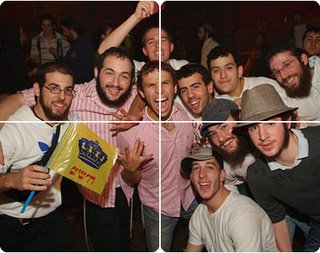
It is dark, both in its street and its heart. Maybe moonshine will reflect once in a while, and stars might even blink, but street and heart remain black.
We – who have come from the white stone – can see the (b)lack of light as it reflects off shadow onto sidewalk; and if you listen closely you can hear it speak dirty, and dark, words.
Between crumbling cement walls tattooed in graffiti, we wait on line (though offline) for our tickets. It is strange, (maybe
Jewdicious?) knowing everyone around you is Jewish: kind of feels like the splitting of the Sea – except here there is no Moses and no sea; all that seems to be left here is the split.
Now we secure ourselves past the security, and bounce ourselves past the bouncers. As we make our way along posters advertising bands mundane in letters holy, the shivering darkness seems to crawl along with us, intensifying with our heart beat – boom, boom.
Things are shaking in and out of rhythm – boom, bam. Smoke swirling in lights very colorful, flash, flesh. Quiet, the cover band has ended. Only stagehands moving about, tuning gilded guitars, fastening symbolic symbols, slapping basic basses, maneuvering speechless speakers, wiring ample amplifiers. And all is dark – and silent.
Some nervous whispering, maybe a catcall, but that’s it. It is really quiet and dark.
Then a piercing note is heard, like an alarm not at all alarming, and darkness starts turning to light. A tall man, dressed in the customary suit and hat, black and white, is using reggae as a tool – a craftsman expertly transforming Barby, a Tel Aviv nightclub, into a Jewish experience.
He places his right hand over his eyes and, with somewhat of a Jamaican tanginess, says Shema Yisrael. Dreadlocks listen intently, and sway insatiably, as he sings of light coming out of darkness – lyrical not only in words, but as this once dark club and cold city can attest, in action as well.
Warmth permeates through the wires and out the speakers, into hearts once cold. “If you are already there, there is no where to go”, he sings; “If your cup’s already full, then it’s bound to overflow” – and here the cup really does run over, but with a message of Truth.
Of course there are those that say a club is not the place for a Hasidic man – but then neither is the body a place for the soul, nor earth a home for heaven. Unfortunately we live in a dark environment, where anything pure is concealed; but if not we, than who will reveal the light within the darkness, who will turn a club into a sanctuary, who will transform the earth into a home of G-d?
Yes, we live in a world of challenges – but do you wish to be the challenged or do you wish to be the challenger? Do you wish to listen or do you wish to speak? Do you wish to be a spectator or do you wish to be a player? Life is a challenge, yes, but (therefore) life is challengeable no less – either you challenge it, or it will challenge you.
Now we step out of the club. Everything is lighter, both in its street and its (and our) heart. The moon still reflects, but now off our faces; the stars still blink, but now it’s more of a wink.
I guess it really is kind of like the splitting of the Sea: there is a sea of knowledge, and though we seem to be split, there is a Moses within every one of us – as a bearded reggae Hasid just proved – that can inspire a club, a people, a world, into turning black into white, darkness into light, Tel Aviv into Jerusalem.
“In the spiritual desert things are not what they seem – you just got to chop ‘em down.”

